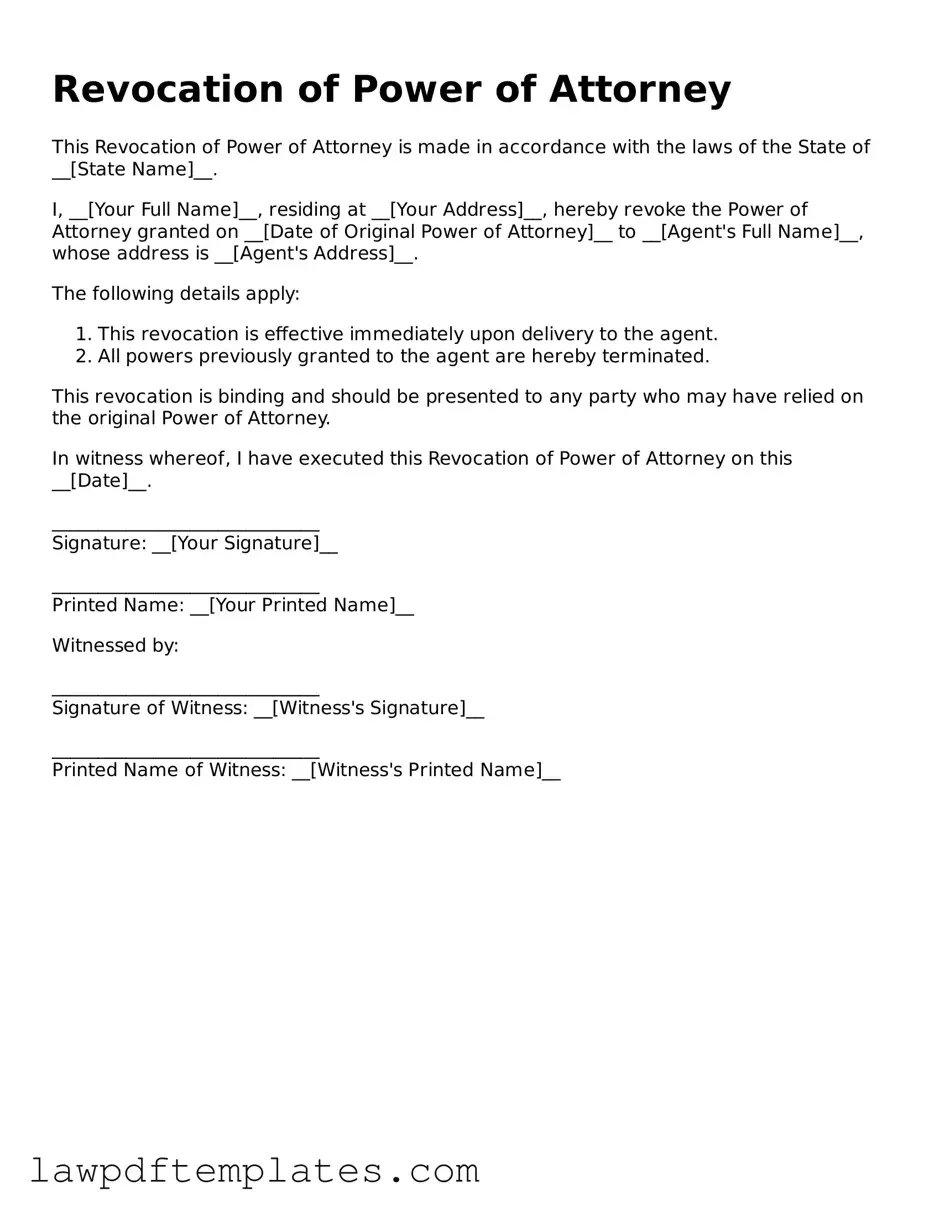Attorney-Approved Revocation of Power of Attorney Document
Form Breakdown
| Fact Name | Description |
|---|---|
| Definition | A Revocation of Power of Attorney form is a legal document that cancels a previously granted power of attorney, effectively ending the agent's authority to act on behalf of the principal. |
| State-Specific Requirements | Each state has its own rules regarding the revocation process. For example, in California, the governing law is found in the California Probate Code, while in Texas, it is governed by the Texas Estates Code. |
| Notification | It is advisable to notify the agent and any third parties who were relying on the power of attorney about the revocation to avoid confusion or misuse of authority. |
| Execution | The form typically must be signed by the principal and may require notarization or witnesses, depending on state laws. |
| Effectiveness | The revocation is effective immediately upon signing, unless specified otherwise in the document. This means that the agent must cease all actions on behalf of the principal right away. |
Sample - Revocation of Power of Attorney Form
Revocation of Power of Attorney
This Revocation of Power of Attorney is made in accordance with the laws of the State of __[State Name]__.
I, __[Your Full Name]__, residing at __[Your Address]__, hereby revoke the Power of Attorney granted on __[Date of Original Power of Attorney]__ to __[Agent's Full Name]__, whose address is __[Agent's Address]__.
The following details apply:
- This revocation is effective immediately upon delivery to the agent.
- All powers previously granted to the agent are hereby terminated.
This revocation is binding and should be presented to any party who may have relied on the original Power of Attorney.
In witness whereof, I have executed this Revocation of Power of Attorney on this __[Date]__.
_____________________________
Signature: __[Your Signature]__
_____________________________
Printed Name: __[Your Printed Name]__
Witnessed by:
_____________________________
Signature of Witness: __[Witness's Signature]__
_____________________________
Printed Name of Witness: __[Witness's Printed Name]__
Common mistakes
When individuals decide to revoke a power of attorney, they often encounter challenges in completing the necessary form. One common mistake is failing to provide clear identification of the original power of attorney. It is crucial to include details such as the names of both the principal and the agent, as well as the date when the original document was executed. Without this information, the revocation may not be valid.
Another frequent error involves not signing the revocation form properly. Many people overlook the requirement for the principal's signature, assuming that a simple notification is enough. The revocation must be signed by the individual who granted the power, and in some cases, it may also need to be witnessed or notarized. Ignoring these requirements can lead to complications.
Additionally, individuals sometimes neglect to distribute copies of the revocation to relevant parties. After completing the form, it is essential to inform the agent and any institutions that were relying on the original power of attorney. Failure to do so can result in the agent continuing to act on behalf of the principal, which defeats the purpose of the revocation.
Lastly, people often forget to check local laws regarding the revocation process. Each state may have specific requirements or forms that need to be followed. Not adhering to these regulations can render the revocation ineffective. It is always wise to consult legal resources or professionals to ensure compliance with local laws.
Consider Popular Types of Revocation of Power of Attorney Documents
Power of Attorney Florida for Child - In the case of divorce or separation, it can clarify custodial responsibilities.
In today's complex world, having a reliable Power of Attorney form is essential, as it allows individuals to maintain control over their affairs through trusted representatives. For those who seek a convenient way to create this important document, resources like Fast PDF Templates offer templates that simplify the process, ensuring that their rights and preferences are upheld effectively.
